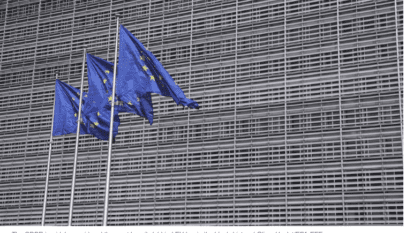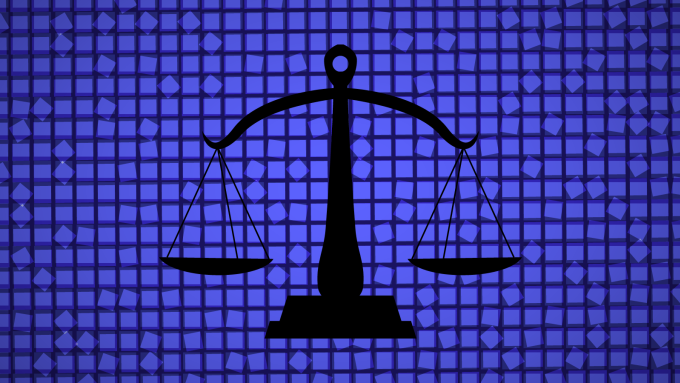
A highly anticipated ruling by Europe’s top court has just landed — striking down a flagship EU-US data flows arrangement called Privacy Shield.
“The Court of Justice invalidates Decision 2016/1250 on the adequacy of the protection provided by the EU-US Data Protection Shield,” it wrote in a press release.
The CJEU’s finding is that “the requirements of US national security, public interest and law enforcement have primacy, thus condoning interference with the fundamental rights of persons whose data are transferred to that third country”, and that mechanisms in the EU-US Privacy Shield ostensibly intended to mitigate this interference (such as an ombudsperson role to handle EU citizens’ complaints) are not up the required legal standard of ‘essential equivalence’ with EU law.
In short, boom.
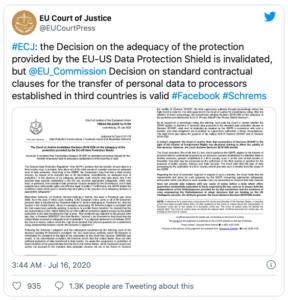
The case — known colloquially as Schrems II (in reference to privacy activist and lawyer, Max Schrems, whose original complaints underpin the saga) — has a long and convoluted history. In a nutshell it concerns the clash of two very different legal regimes related to people’s digital data: On the one hand US surveillance law and on the other European data protection and privacy.
Putting a little more meat on the bones, the US’ prioritizing of digital surveillance — as revealed by the 2013 revelations of NSA whistleblower, Edward Snowden; and writ large in the breadth of data capture powers allowed by Section 702 of FISA (Foreign Intelligence Surveillance Act) and executive order 12,333 (which sanctions bulks collection) — collides directly with European fundamental rights which give citizens rights to privacy and data protection, as set out in the EU Charter of Fundamental Rights, the European Convention on Human Rights and specific pieces of pan-EU legislation (such as the General Data Protection Regulation).
The Schrems II case also directly concerns Facebook, while having much broader implications for how large scale data processing of EU citizens data can be done.
It’s worth noting that today’s decision does not concern so called ‘necessary’ data transfers — such as being able to send an email to book a hotel room. Rather this is about the bulk outsourcing of data processing from the EU to the US (typically undertaken for cost/ease reasons). So one knock on effect of today’s ruling might be that more companies switch to regional data processing for European users.
The original case raised specific questions of legality around a European data transfer mechanism used by Facebook (and many other companies) for processing regional users’ data in the US — called Standard Contractual Clauses (SCCs). That mechanism has not been struck down by today’s ruling, though judges have made it clear that third country context around the use of SCCs is king and EU regulators must step in when they suspect data is flowing to unsafe locations outside the bloc.
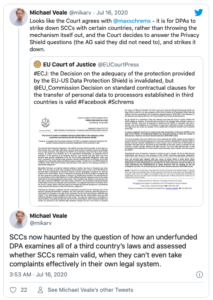
Schrems challenged Facebook’s use of SCCs at the end of 2015, when he updated an earlier complaint on the same data transfer issue related to US government mass surveillance practices with Ireland’s data watchdog.
He asked the Irish Data Protection Commission (DPC) to suspend Facebook’s use of SCCs. Instead the regulator decided to take him and Facebook to court, saying it had concerns about the legality of the whole mechanism. Irish judges then referred a large number of nuanced legal questions to Europe’s top court, which brings us to today. Facebook, meanwhile, repeatedly tried and failed to block the reference to the Court of Justice. And you can now see exactly why they were so keen to derail this train.
The referral by the Irish High Court ended up looping in questions over the European Commission’s flagship data transfer agreement, the EU-US Privacy Shield. This replaced a long standing EU-US data transfer agreement, called Safe Harbor, which was struck down by the CJEU in 2015 after an earlier challenge also lodged by Schrems. (Hence Schrems II — and now strike two for Schrems.)
So part of the anticipation associated with this case has been related to whether Europe’s top judges would choose to weigh in on the legality of Privacy Shield — a data transfer framework that’s being used by more than 5,300 companies at this point. And which the European Commission only put in place a handful of years ago.
Critics of the arrangement have maintained from the start that it does not resolve the fundamental clash between US surveillance and EU data protection. While, in recent years, with the advent of the privacy- and rights-hostile Trump administration, Privacy Shield has looked increasingly precariously placed, as we’ve reported. An influential advisor to the court had also raised a raft of concerns over the mechanism in an opinion which prefigured today’s ruling.
In the event, the CJEU has waded in and sided with Privacy Shield critics who have always said the framework is the equivalent of lipstick on a pig. Today is certainly not a good day for the European Commission (which also had a very bad day in court yesterday on a separate matter).
The Commission convened a brief press briefing at noon to offer an initial response to the bombshell judgement on their flagship transatlantic data transfer mechanism. During the session Věra Jourova, the commissioner with responsibility for trust and transparency, emphasized that legal mechanisms for transatlantic data transfers do still exist for businesses to use.
“The Court of Justice declared the Privacy Shield decision invalid but also confirmed that the Standard Contractual Clauses remain a valid tool for the transfer of personal data to processors established in the third countries. This means that the transatlantic data flows can continue based on the broad toolbox for international transfers provided by the GDPR,” she said, naming “binding corporate rules” and SCCs as available options.
She also said the executive is continuing its work on modernizing SCCs (i.e. to bring them into alignment with the GDPR) — but without providing any firm timeline for that update of the tool, which was developed under the prior EU data protection directive.
“I know citizens and businesses are seeking reassurance today on both sides of the Atlantic so let me be clear we will continue our work to ensure the continuity of safe data flows,” she said. “Today’s ruling provides further valuable guidance for us and we will make sure that the updated tool will be fully in line with it.”
She said the Commission has already contacted US counterparts to begin the process of discussing a way forward now that Privacy Shield lies in pieces.
On this issue her comments were at times blunt, as she chose to highlight “certain deficiencies” the Commission had raised with US counterparts during the annual Privacy Shield review process, while eliding the fact it had nonetheless rubberstamped the arrangement anyway, ignoring repeat warnings (including from EU privacy regulators and the EU parliament) that the framework was flawed and would not stand up to legal challenge.
“In its judgement today the Court of Justice of the EU once again underlined that the right of European citizens to data protection is absolutely fundamental,” she said. “It confirms also what the Commission has said many times that what we have been working on when personal data travels abroad from Europe it must remain safe.”
While pledging to work “closely” with American counterparts to try to chart a course towards a replacement for the now defunct Privacy Shield, Jourova was clear where the movement would need to come from. “We have never hidden that we would like to see more convergence,” she said. “We would like to see on American side the federal law on data protection which would be equivalent or very similar to the GDPR which would stipulate equivalent and strong safeguards for the protection of private data of the citizens.
“We have also actively lobbied — for instance for changes in the FISA law. Or in some other items of the American laws but we cannot do the magic and change the American laws from Europe. It’s for the American partners to reflect on that.”
In a response statement put out around the same time, U.S. secretary of commerce, Wilbur Ross, expressed deep disappointment at the ruling — but said the department would continue to administer the Privacy Shield program, including processing submissions for self-certification and re-certification and to maintain the current list (which has previously included the disgraced data hijacker, Cambridge Analytica).
Today’s decision does not relieve participating organizations of their Privacy Shield “obligations”, the statement further claimed.
“While the Department of Commerce is deeply disappointed that the court appears to have invalidated the European Commission’s adequacy decision underlying the EU-U.S. Privacy Shield, we are still studying the decision to fully understand its practical impacts,” said Ross. “We have been and will remain in close contact with the European Commission and European Data Protection Board on this matter and hope to be able to limit the negative consequences to the $7.1 trillion transatlantic economic relationship that is so vital to our respective citizens, companies, and governments. Data flows are essential not just to tech companies — but to businesses of all sizes in every sector. As our economies continue their post-COVID-19 recovery, it is critical that companies — including the 5,300+ current Privacy Shield participants — be able to transfer data without interruption, consistent with the strong protections offered by Privacy Shield.”
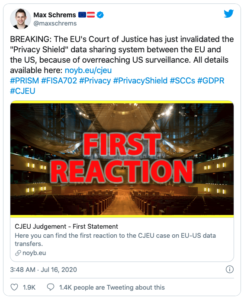
As well as finding itself looped into Schrems’ Facebook SCCs challenge, Privacy Shield has also been under separate legal challenge — with the complainant in that case (La Quadrature du Net) arguing the mechanism breaches fundamental EU rights and does not provide adequate protection for EU citizens’ data. That case now looks moot.
On SCCs, the CJEU has not taken issue with the mechanism itself — which, unlike Privacy Shield, does not contain an assessment on the quality of the protections offered by any third country; it’s merely a tool which may be available to use if the right legal conditions exist to guarantee EU citizens’ data rights (and one that importantly includes a regulatory kill switch) — but judges asserted the obligation on data controllers to carry out an assessment of the data protection afforded by the country where the data is to be taken.
If the level is not equivalent to that offered by EU law then the controller has a legal obligation to suspend the data transfers. This also means that EU regulators — such as Ireland’s DPC — have a clear obligation to act on complaints and suspend data transfers which are taking place via SCCs to third countries where data protections are not adequate (such as, as the CJEU has made clear, the US). Which was exactly what Schrems had asked the Irish regulator to do in the first place.
It’s not immediately clear what alternative exists for companies such as Facebook — which do fall under US surveillance laws and are using SCCs to take EU citizens’ data to the US — given judges have invalidated Privacy Shield on the grounds of the lack of protections afforded to EU citizens data in the country. As it stands the NSA is standing in the way of their EU data flows via even the remaining mechanisms.
“In the absence of an adequacy decision, such transfer may take place only if the personal data exporter established in the EU has provided appropriate safeguards, which may arise, in particular, from standard data protection clauses adopted by the Commission, and if data subjects have enforceable rights and effective legal remedies,” the court notes in today’s press release — pointing to Article 49 of the GDPR, which sets out conditions “under which such a transfer may take place in the absence of an adequacy decision or appropriate safeguards”. (These conditions are narrow — and include the explicit consent of the data subject; or for necessary transfers or transfers in the public interest or the interest of the data subject.)
However in initial responses to the judgement some large tech companies were seeking to reassure customers that data transfers would be unaffected.
In a blog post on the ruling, Microsoft’s corporate VP for privacy, Julie Brill, wrote: “For years we have provided customers with overlapping protections under both the Standard Contractual Clauses (SCCs) and Privacy Shield frameworks for data transfers. Although today’s ruling invalidated the use of Privacy Shield moving forward, the SCCs remain valid. Our commercial customers are already protected under SCCs.”
While it’s right to say that SCCs as a data transfer mechanism remain valid, the specific context of where exactly data is being taken is key — and could open companies to legal risk if, for example, they’re processing data in the US where it may be subject to surveillance.
Here’s more on the court’s overall reasoning from the press release:
The Court considers, first of all, that EU law, and in particular the GDPR, applies to the transfer of personal data for commercial purposes by an economic operator established in a Member State to another economic operator established in a third country, even if, at the time of that transfer or thereafter, that data may be processed by the authorities of the third country in question for the purposes of public security, defence and State security. The Court adds that this type of data processing by the authorities of a third country cannot preclude such a transfer from the scope of the GDPR.
Regarding the level of protection required in respect of such a transfer, the Court holds that the requirements laid down for such purposes by the GDPR concerning appropriate safeguards, enforceable rights and effective legal remedies must be interpreted as meaning that data subjects whose personal data are transferred to a third country pursuant to standard data protection clauses must be afforded a level of protection essentially equivalent to that guaranteed within the EU by the GDPR, read in the light of the Charter. In those circumstances, the Court specifies that the assessment of that level of protection must take into consideration both the contractual clauses agreed between the data exporter established in the EU and the recipient of the transfer established in the third country concerned and, as regards any access by the public authorities of that third country to the data transferred, the relevant aspects of the legal system of that third country.
Regarding the supervisory authorities’ obligations in connection with such a transfer, the Court holds that, unless there is a valid Commission adequacy decision, those competent supervisory authorities are required to suspend or prohibit a transfer of personal data to a third country where they take the view, in the light of all the circumstances of that transfer, that the standard data protection clauses are not or cannot be complied with in that country and that the protection of the data transferred that is required by EU law cannot be ensured by other means, where the data exporter established in the EU has not itself suspended or put an end to such a transfer.
Commenting on the ruling in a statement, a jubilant Schrems said:..
Understanding the Dutch Approach to GDPR Fines: Why Canadian Companies Need to Pay Attention
⚠️ IMPORTANT UPDATE This article accurately describes the Dutch AP’s pioneering…




